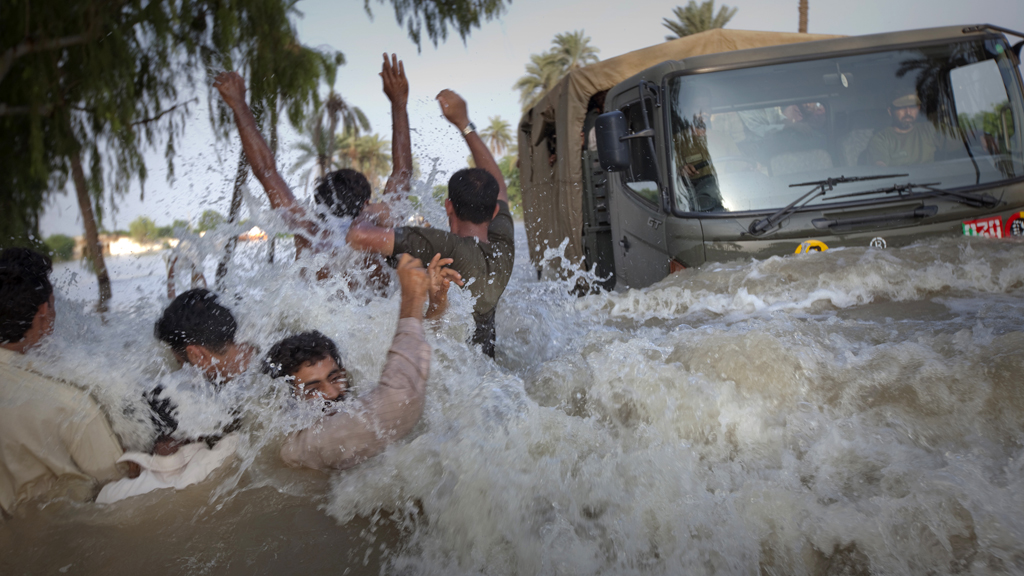Climate countdown: how vulnerable millions will suffer
Flooding, famine, drought and disease – the impact of climate change predicted in the IPCC scientists’ report could have a negative impact for millions of people in the poorest parts of the world.

The IPCC report warned of sea level rises of up to 82 centimetres, temperature increases of four degrees celsius, and more frequent, and more ferocious storms, by the end of the century.
However, the report also suggests that it is not too late to prevent the worst impacts of climate change – if countries of the world act now. But who will these worst impacts affect?
Nasa predicts a range of global impacts from climate change, including the increased water stress for up to 250m people in Africa, and the death rate from disease associated with floods rising in Asia.
It has also used the IPCC’s data to visualise the impact of rising temperatures until the end to the century (see video, below).
‘Most vulnerable’
Tim Gore, head of policy at Oxfam’s Grow campaign for food justice, told Channel 4 News that the people at risk are those who are already most vulnerable, across South Asia and Africa.
“The main impact we are concerned about is on hunger, on people not having enough food to eat,” he said.
“We know that that as temperatures rise and you get more extreme weather events, protection of food becomes very hard.
“Increased temperatures will mean harvests suffer, and when you get extreme weather events entire harvests can be destroyed.”
The IPCC report warns that climate change will lead to increased extremes of hot weather, and predicts as much as a four degrees Celsius increase in the global temperature by 2100.
Extreme heat
A recent World Bank report said a four degrees increase would mean “heat extremes are projected to affect increasing proportions of the region, with adverse consequences for food production systems, ecosystems and human health.
“Direct and indirect impacts on human health are also expected, and an acceleration of the urbanisation trend in response to additional pressures caused by climate change is likely to compound vulnerability.”
By way of example, Mr Gore said this could have a devastating impact on Africa’s pastoral, nomadic communities.

He said: “We know that as temperatures increase that will have an impact on the health of cattle, more will die in heatwaves.
“That is a direct impact on the cattle on which their livelihood depends.”
Water
A common misconception is that climate change is about increased heat and, though this is a factor, there are also concerns over extremes of weather and the rising sea level.
We are talking about thousands, and ultimately millions, of people being effected and on the move. Tim Gore, Oxfam
People in South Asia are predicted to be among those that suffer the most from these effects, through a combination of flooding and reduced water security.
“We have seen the impact already in Pakistan,” Mr Gore said. “There were major floods in 2010, 20 million people were affected.
“There have also been a couple of further floods in the years since – and these have a cumulative effect. It is hard enough to bounce back from one weather event.
“In a country like Pakistan where many people are lacking basic services and lack food security the implications of this report are quite frightening.”

In areas around Bangladesh, home to millions of people, flooding does not just damage homes, he said. The intrusion of saltwater onto farm land renders it “permanently ruined”.
“We are talking about thousands, and ultimately millions, of people being affected and on the move,” he said. “When people are hungry, when it comes to feeding their families, they move.”
There are numerous ways in which the people Oxfam works with are already experiencing this now, as they struggle to make their way out of poverty. Tim Gore, Oxfam
The World Bank predicts a rise in sea levels of 30 centimetres (the IPCC projections range from an increase of between 26 centimetres and 63 centimetres by the end of the century) would reduce rice production in the region’s major rice growing region – the Mekong river delta – by about 2.6 million tonnes per year, or about 11 per cent of 2011 production.
The World Bank also warns of other impact, such as the destruction of coral reefs as the sea’s temperature increases, extremes of heat, and increased intensity of tropical cyclones.
Additionally, people living around the Ganges delta in India, who are dependent on the water from Himalayan glaciers flowing through the land, face the negative impact of these glaciers melting faster, and retreating.
Feeling the effects
The ability to grow food as it the heart of Oxfam’s concerns. Mr Gore said that certain crops, such as cocoa in west Africa and coffee in east Africa, are particularly vulnerable to weather changes.
In Latin America, “la Roya”, a disease that affects coffee plants, has been recorded as rising to higher altitudes, reducing the areas in which the crop can be farmed.
The World Bank says Latin America is likely to see more floods, droughts, reduced arable lands and the possible loss of low-lying regions caused by climate change.
Read more on Science Editor Tom Clarke's blog: 'Sure as dammit' - IPCC's latest verdict on global warming
“It’s possible and necessary to create policies and programmes which help to combat climate change in the most inclusive fashion,” writes Ede Ijjasz-Vasquez, World Bank director for sustainable development.
For Mr Gore, the “climate change debate” is a misnomer.
“There are numerous ways in which the people Oxfam works with are already experiencing this now, as they struggle to make their way out of poverty,” he said.
“Sometimes it’s a shock to hear the debates as to whether climate change is real – if you talk to the people that Oxfam works with there is now doubt.”